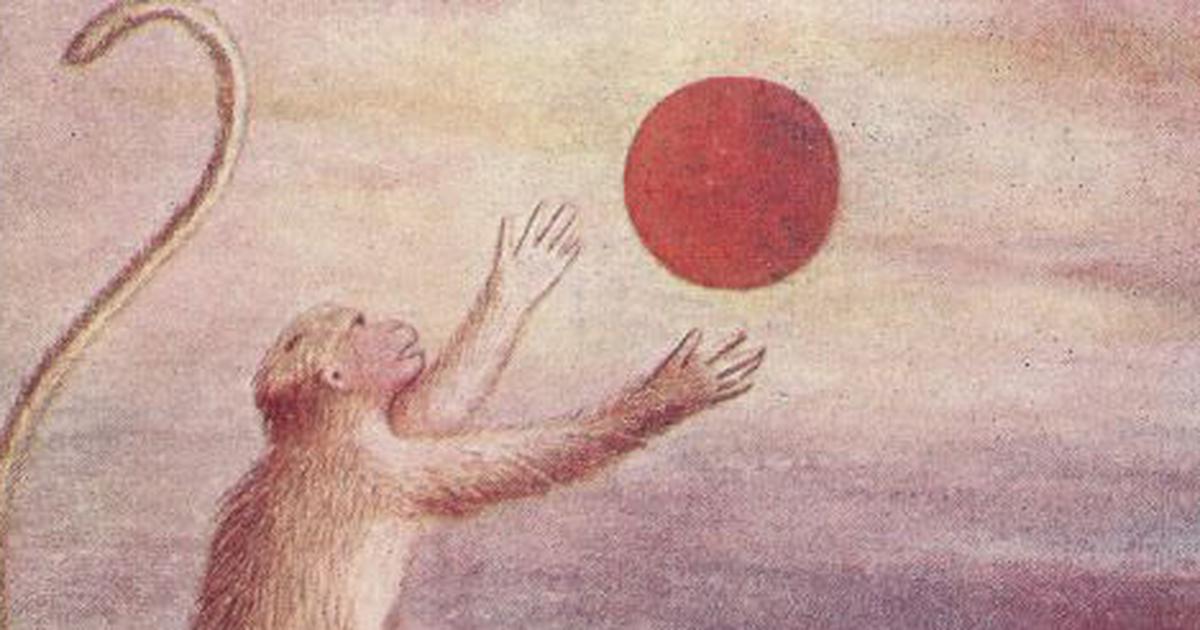After he had mastered the art of Pramanthan, or making fire by striking wood on wood, the King sent forth Hantara and Byadha to teach his subjects.
Though they slept at night in the royal palace, the two men spent their days among the commoner monkeys of the realm. During their absence, Hanuman experimented on a way of making fire more easily than by striking long pieces of timber on one another. He thought of producing the flame by striking a metal on a rock. Alas, he failed almost invariably, no matter what he tried.
One day, completely downhearted, he begged for his mother’s advice: “You, who are versed in the ways of men and gods, you alone can guide me.”
To comfort his dejected spirit, Anjana readily spoke of the source to which he should go: “You must go to the maker of fire in the sky, the Thunder-god.”
“But how can I reach and speak to the Thundergod?” Hanuman wished to be instructed. “Instruct me, please.”
“That is easy,” Anjana assured him. “During a thunderstorm, leap up to the sky and see the way he, the Thunder, ignites his bolts.”
“But would not the bolt scorch me?” Hanuman asked with trepidation.
“That it cannot, if you approach the god in the right spirit and from the proper direction.” Anjana instructed him further, “Pray to him day after day – ‘yat te Dakshinam Mookhum’ – withdraw your scorching fury; protect me with thy mercy, O solitary wanderer. If you pray, he will answer your prayer.”
Every morning for over a month, Hanuman prayed to the Thunder, the solitary wanderer. This happened to be the period of drought in India.
Exactly on the fortieth daybreak, as Hanuman had finished his prayer, the July cloud rose in the south. As an elephant strikes a mound with its tusks, the black cloud smote the turquoise precipices of Heaven with its lightning.
Drawn irresistibly by the sight of the god, Hanuman sprang to the sky. At home in the air, like a wild swan, he flew higher and higher. He passed flocks of celestial birds sailing on wings that glittered like rainbows, and geese of moon-shaming radiance flocked past him. Herons of crystal, and hummingbirds, and kingfishers stabbed his sight with their splendour.
Today he had no eyes for them. He wanted to circle round the storm in order to reach the presence of Bajra, Thunder. Led rather by a sure instinct than by ideas, he leaped over the cloud crest and ran right into the arms of a storm.
“What are you doing here?” he heard a familiar voice ask.
“Father!” exclaimed Hanuman stirred with affection. “What are you doing?”
“If you want to help me,” spoke Pavana in a matter-of-fact tone, “sit on my back and blow on these clouds. They are slow as a herd of goats. I seem not to push them very fast. Maybe our two breaths will hasten them northward.”
Hanuman did as he was told. And after the clouds had begun to move very fast, he confided to his father the purpose of his errand, “Where can I find that God of Thunder?”
Pavana answered, “Thunder dwells on the summit of ether, a few miles up. Spring up to him and ask him in my name to tell you of his secret. He is your uncle, my brother. Vault upwards… Yes, I am going down… to convey to your mother the fact that I have seen you safely sailing on.”
Hanuman leaped off his father’s back and then was lost to hearing and sight. He pushed forward with so much force that in a short while, he stood on tiptoe on the argent peaks of ether, where he beheld Vishwakarma, the god, more luminous than Jupiter, striking a piece of metal with a thing like a stone. And the flying sparks zigzagged past the clouds that Pavana was hurling forward.
Humbly bowing to the god, he made himself and his mission known. His sincerity convinced Vishwakarma. Without another word, the divine one placed in the youth’s hands the subtler secret of fire and electricity, remarking, “Teach them how to strike metal on stone. This will make the daily creation of hearth-fire very easy. But the other they must dream of for centuries to come. Someday, their dreams and those of their descendants will come true, making mankind master of the bolt of the gods. Remember, my son, electricity they must dream about.”
After bowing to him with deep gratitude, Hanuman took leave and flew away from the nest of Thunder. On his arrival home at sundown, he found his father and mother holding a conversation on the palace roof with Hantara and Byadha.
The latter was saying: “Now that a score of monkeys have learned to make fire and a hundred, at least, know how to drink water in human fashion, you will take us home, O great God of Storms. We beg you to ask King Hanuman to set us free.”
Just at this moment, the King landed nearby. “You shall be free,” Hanuman proclaimed to the two teachers. “Besides, you shall take with you the instruments by which fire can be made most conveniently.”
Within a week’s time, after fully acquiring the art of making not only fire, but also lightning sparks, Hantara and Byadha went home to teach mankind those arts. The new method of making fire proved to be a great improvement over the older one. This mankind owes to Hanuman.

Excerpted with permission from Hanuman the Hero, Dhan Gopal Mukherji, Talking Cub.










